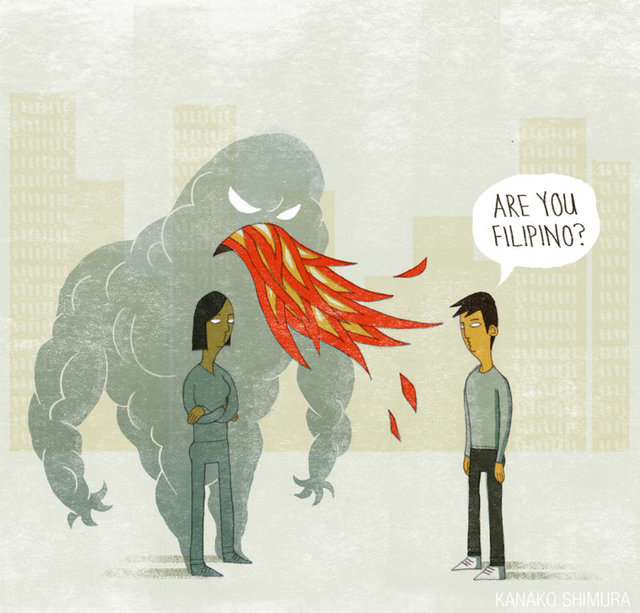Shakira Sison questions why a seemingly innocuous question can be reciprocated with such disgust and awkwardness

I almost leapt when I saw that a pop-up stall at a Brooklyn food festival had sisig on its menu. I drooled when I read the rest of the dishes on its corrugated steel-backed blackboard: Bicol express, afritada, lumpia. I became giddy like a kid given a Choc Nut.
The line was long, and understandably so. It was one of two Asian stalls and it was very rare to encounter Filipino food in one of those venues. The shack was named after the national dish, the cook was Pinoy, and the servers reminded me of my high school classmates in St. Scho. My wife and I were excited. We had been craving Filipino food for a while. The closest tapsilog was thirty minutes away from us by car.
An honest question
After ordering our sisig, Bicol express, lumpiang shanghai and kropek, my wife tried to engage in small talk and asked the cashier, "Are you Filipino?"
She paused for a moment, hesitated, and slowly exhaled. There was a familiar exasperation on her face as she looked down, frowned, and said, "Well, I was born there. But I grew uphere."
The air between us could have frozen the fragrant dishes she was serving. Shocked at her reaction, we stepped back and simply said, "Oh."
From the kitchen, a woman who looked just like her (possibly a sister) sensed the tension and interrupted the thick and awkward silence.
"We were born in the Philippines," she said, and then, "But we're Chinese," to close the conversation. Her face matched the cashier's annoyed demeanor, which was unfortunately too familiar.
I recognized those expressions because I'd seen them many times before. She shared the face of a number of other Pinoys I've met in New York.
The annoyed Fil-Ams of New York
One of them was a client at my old job, whose Spanish name on his credit card gave his Asian looks away as Filipino. When I asked if he was, he took his card away and grunted, "Yes." I was a new transplant in New York so I excitedly said, "Me too!" But he simply said, "I know," as he rolled his eyes and turned his back on me, obviously slighted, letting me know that it was not up for discussion.
Back at the Brooklyn food fest, my wife and I sat and pushed our sisig, Bicol express, and lumpia around in our rice bowls, wondering if we pissed off those two ladies at the counter. My wife had only wanted to compliment them on putting up a Filipino stall because it got us so excited. We weren't planning on discussing family connections or even talking about the Philippines, although with the way they reacted we might as well have asked them for money to buy ourselves some Chickenjoy, or dragged them to the Filipino community in Queens and force-fed them binagoongan.
Unfortunately, this Fil-Am animosity has become fairly regular. Once, upon surfacing from the subway, I spotted two Pinay tourists. Struggling with a map, the older one said, "Eh diba nanggaling na tayo dyan? (Didn't we already pass that?)"
I slowed my walking, debating whether or not I should help. I've been burned many times by my helpfulness, but I figured I'd want help if I were in their place, so I approached the pair and said, "May hinahanap kayo? (Are you looking for something?)"
The younger woman froze, put down her map, and gave me an icy look. The older woman sensed her daughter's animosity and simply said, "Wala." The daughter turned her back on me and returned to her map. Their repulsion caused me to just say, "Okay..." and resume my walk home.
A face that screams Pinoy
Being an immigrant, I know what it's like to be known only for my race. I've experienced introductions where I was immediately asked if I were a nurse or a nanny, or if I knew any mail-order brides. Every day as a person of color is a challenge in battling stereotypes. I've been in a job interview where the first question was, "Will you have a problem with the English language?" before I even opened my mouth.
I've met my share of Pinoys who will pry too much during the first meeting, prodding you for your family tree and reminiscing about things you either don't care for or aren't in the mood to discuss. I'm careful not to step on toes when trying to reach out to a fellow Filipino in another country. I am a stranger after all, and they are not obliged to be polite.
I also understand what it's like to grow up in a country where your face doesn't match the majority, where no matter how white you act or dress or speak, you're still a brown person from the tropics because your face screams it out to the world.
It's totally understandable then when my question "Are you Filipino?" may just set some Fil-Ams off. They must have a million other qualities than just being Pinoy, but I still don't get the defensiveness and denial of some when called out on the obvious, as if the question "Are you Filipino?" were equivalent to "Will you be my accomplice in robbing a bank?"
Looking back, perhaps I could have instead assumed that the shack's staff was Belgian, except that they were not white and they were not manning a waffle truck. Me and my silly stereotypes.
Maybe they just didn't want to discuss their race as an opening line, which I understand, or maybe they just weren't in the mood to be friendly and were afraid I'd ask if they had a Tita Baby or an Uncle Boy. Totally my fault for expecting a bit of hospitality from a Filipino restaurant. I'll be more careful and warn my friends not to be so presumptuous next time!
Not all Fil-Ams
Fortunately, most Fil-Ams embrace their roots. I married one of them, too - Filipinos who came to the US as children who, along with their relatives and friends, will be the first one to greet a fellow Pinoy by screaming, "Kabayan!"
Their parties are overflowing with Filipino food and conversations about the Philippines. If anyone were to be embarrassed in those gatherings to be Filipino, it would be me, ashamed I wasn't Pinoy enough.
For the most part, I can always engage in a discussion with Fil-Ams that begins with, "Taga saan kayo sa'tin? (Where in the Philippines are you from?)" and my interactions with fellow Pinoys generally bring me much joy.
But the exceptions to this have always left me perplexed. I never know if they simply don't want to interact with Filipinos because they don't identify with us, or they simply believe thatsharing one heritage (but identifying with another) does not require them to be kind.
I'll definitely remember that the next time I come across another indifferent Fil-Am, and especially a particularly cold one. I definitely won't forget it the next time I'm eating Filipino food that tastes fine, but is served with such bitterness that it leaves a bad taste in my mouth.- Rappler.com


No comments:
Post a Comment